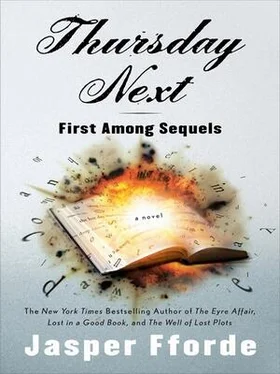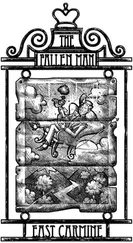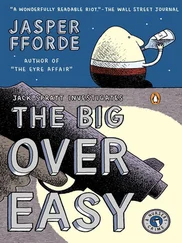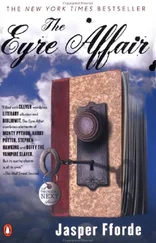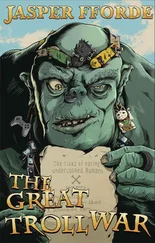We sat in silence for a few minutes to wait for my taxi. I was thinking about the mostly bald Pickwick, Friday’s ChronoGuard pre sen ta tion, Felix8’s return and my perfidy to Landen. Thursday5 had no such worries-she was reading the astrology section of the BookWorld’s premier newspaper, The Word.
After a while she said, “It’s my birthday today.”
“I know.”
“You do? How?”
“Never mind.”
“Listen to what it says in the horoscopes: ‘If it is your birthday, there may be an increased amount of mail. Expect gifts, friendly salutations from people and the occasional surprise. Possibility of cake.’ That’s so weird-I wonder if any of it will come true?”
“I’ve no idea. Have you noticed the amount of Mrs. Danvers you see wandering around these days?”
I mentioned this because a pair of them had been seen at Norland Park that morning. They were becoming a familiar sight in fiction, hanging around popular books out of sight of the reader, looking furtive and glaring malevolently at anyone who asked what they were up to. The excess of Mrs. Danvers in the Book-World was easily explained. Generics, or characters-in-waiting, are created blank, without any personality or gender, and are then billeted in novels until called up for training in character schools. From there they are sent either to populate the books being built or to replace characters who are due for retirement or replacement. The problem is, generics have a chameleonic habit of assimilating themselves to a strong leading character, and when six thousand impressionable generics were lodged inside Rebecca, all but eight became Mrs. Danvers, the creepy house keeper of Manderley. Since creepy house keepers are not much in demand these days, they were mostly used as expendable drones for the Mispeling Vyrus Farst Respons Groop or, more sinisterly, for riot control and any other civic disturbances. At Jurisfiction we were concerned that they were becoming another layer of policing, answerable only to the Council of Genres, something that was stridently denied.
“Mrs. Danvers?” repeated Thursday5, studying a pullout guide to reading tea leaves. “I’ve got one or two in my books, but I think they’re meant to be there.”
“Tell me,” I said by way of conversation, “is there any aspect of the BookWorld that you’d like to learn about as part of your time with me?”
“Well,” she said after a pause, “I’d like to have a go and see what it’s like inside a story during a recitation in the oral tradition-I’ve heard it’s really kind of buzzing. ”
She was right. It was like sweaty live improv theater-anything could happen.
“No way,” I said, “and if I hear that you’ve been anywhere near OralTrad, you’ll be confined to The Great Samuel Pepys Fiasco. It’s not like books where everything’s laid out and orderly. The oral tradition is dynamic like you’ve no idea. Change anything in there and you will, quite literally, give the narrator an aneurysm.”
“A what ?”
“A brain hemorrhage. The same can be said of Poetry. You don’t want to go hacking around in there without a clear head on your shoulders.”
“Why?”
“It’s like a big emotion magnifier. All feelings are exacerbated to a dangerous level. You can find things out about yourself that you never knew-or never wanted to know. We have a saying: ‘You can lose yourself in a book, but you find yourself in Poetry.’ It’s like being able to see yourself when drunk.”
“Aha,” she said in a quiet voice.
There was a pause.
“You’ve never been drunk, have you?”
She shook her head. “Do you think I should try it?”
“It’s overrated.”
I had a thought. “Have you ever been up to the Council of Genres?”
“No.”
“A lamentable omission. That’s where we’ll go first.”
I pulled out my mobilefootnoterphone and called TransGenre Taxis to see where my cab had gone. The reason for a taxi was not altogether obvious to Thursday5, who, like most residents of the BookWorld, could bookjump to any novel previously visited with an ease I found annoying. My intra fictional bookjumping was twenty times better than my trans fictional jumps, but even then a bit ropey. I needed to read a full paragraph to get in, and if I didn’t have the right section in my TravelBook, then I had to walk via the Great Library or get a taxi-as long as one was available.
“Wouldn’t it be quicker just to bookjump?” asked Thursday5 with annoying directness.
“You young things are always in a hurry, aren’t you?” I replied. “Besides, it’s more dignified to walk-and the view is generally better. However,” I added with a sense of deflated ego, “in the absence of an available cab, we shall.”
I pulled out my TravelBook, turned to the correct page and jumped from Sense and Sensibility to the Great Library.
6. The Great Library and Council of Genres
The Textual Sieve was designed and constructed by JurisTech, the technological arm of Jurisfiction. The Textual Sieve is a fantastically useful and mostly unexplained device that allows the user to “sieve” or “strain” text in order to isolate a specified search string. Infinitely variable, a well-tuned Textual Sieve on “full opaque” can rebuff an entire book, but set to “fine” can delicately remove a spiderweb from a half-million-word novel.
I found myself in a long, dark, wood-paneled corridor lined with bookshelves that reached from the richly carpeted floor to the vaulted ceiling. The carpet was elegantly patterned, and the ceiling was decorated with rich moldings that depicted scenes from the classics, each cornice supporting the marble bust of an author. High above me, spaced at regular intervals, were finely decorated circular apertures through which light gained entry and reflected off the polished wood, reinforcing the serious mood of the library. Running down the center of the corridor was a long row of reading tables, each with a green-shaded brass lamp. In both directions the corridor vanished into darkness with no de-finable end.
I had first entered the Great Library sixteen years ago, and the description of it hadn’t altered by so much as a word. Hundreds of miles of shelves containing not every single book but every single edition of every book. Anything that had been published in the real world had a counterpart logged somewhere within its endless corridors.
Thursday5 was nearby and joined me to walk along the corridor, making our way toward the crossover section right at the heart of the library. But the thing to realize was that it wasn’t in any sense of the word real, any more than the rest of the Book-World was. The library was as nebulous as the books it contained; its form was decided not only by the base description but my interpretation of what a Great Library might look like. Because of this the library was as subtly changeable as my moods. At times dark and somber, at others light and airy. Reading, I had learned, was as creative a process as writing, sometimes more so. When we read of the dying rays of the setting sun or the boom and swish of the incoming tide, we should reserve as much praise for ourselves as for the author. After all, the reader is doing all the work-the writer might have died long ago.
We approached another corridor perpendicular to the one we had just walked down. In the middle of the crossway was a large, circular void with a wrought-iron rail and a spiral staircase bolted securely to one side. We walked over to the handrail and peered down. Not more than thirty feet below us, I could see another floor, exactly like this one. In the middle of that floor was another circular void through which I could see another floor, and another and another, and so on to the depths of the library. It was the same above us.
Читать дальше
